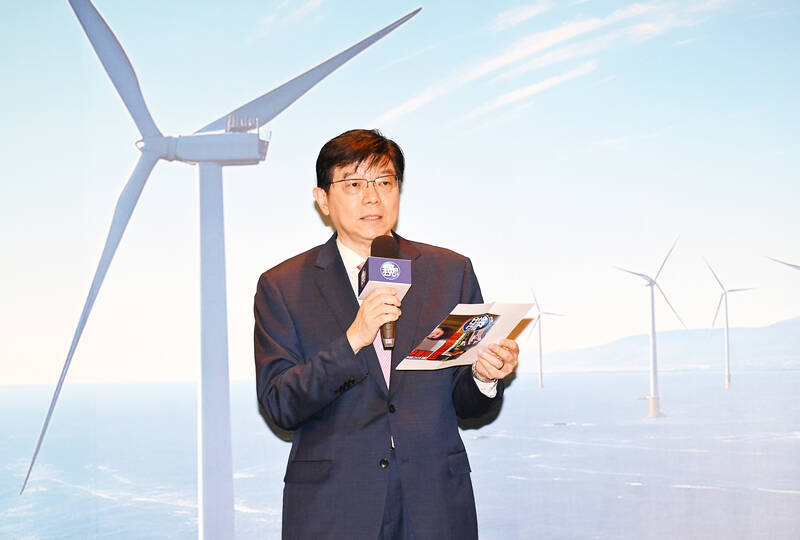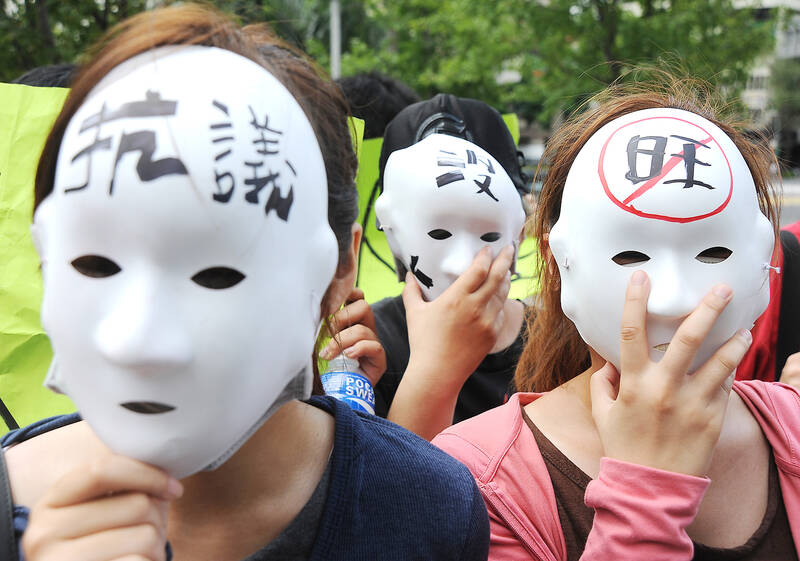Last week the pro-China parties announced the first victims of the new legislative program, likely intended to send a chill through the local press: the National Communications Commission (NCC) and its approval of Mirror News. The move highlights both the irregularities around regulatory approval in Taiwan’s divided politics, and the irrepressible need of the Chinese Nationalist Party (KMT) to attack and control the media. Like Fu Kun-chi’s (傅?萁) program to slather concrete across the east coast, it recalls the era of former president Ma Ying-jeou (馬英九) and his attempts to deliver Taiwan to the People’s Republic of China (“Notes from Central Taiwan: The once and future king of Hualien,” June 10, 2024).
Mirror Media was founded in 2016 as a print weekly started by Pei Wei (裴偉), the former chief editor of Next Magazine, whose reporting had summoned lawsuit after lawsuit. Pei brought over a number of people from Next. In December of 2019 Mirror submitted an application to the NCC to open a TV news station.
Ironies abounded in the move. The NCC, was established in 2006 by the KMT legislature to do an end run around then-Democratic Progressive Party (DPP) president Chen Shui-bian’s (陳水扁) control of government media and media oversight, to bring mass media under KMT control by centralizing media oversight in legislative (read: KMT) hands and chill pro-Taiwan speech. Members are appointed in proportion of party control of the legislature. It is easy to forget that the last eight years of press freedom in Taiwan have been historically anomalous, because the DPP controlled the legislature.

Photo: Tien Yu-hua, Taipei Times
THE COMING STRUGGLE
The Ma era should be understood as the template for KMT actions in the democratic era, and for the KMT’s coming moves. Fierce struggles were fought over media freedom. The Public Television Service (PTS) became the site of a bitter fight over control, as in June of 2009 the legislature enlarged the board of directors for the PTS. Since the PTS was funded by the old Government Information Office (GIO), the GIO instantly appointed eight new directors, a move the Control Yuan censured six months later. Under Ma, the GIO was eventually closed and replaced by the Central News Agency (CNA), which the KMT hoped would give it greater control over the media.
The Ma administration also saw the Next Media group of Hong Kong media mogul Jimmy Lai (黎智英), now rotting in jail in the People’s Republic of China (PRC), twice attempt to purchase the pro-PRC China Times Group, but was rejected. Lai had been harshly critical of Beijing. The group was eventually sold to pro-PRC gazillionaire Robert Tsai (蔡衍明) of the Want Want group, who then attempted to form the notorious “media monster” by purchasing the Next Media group.

Photo: Liu Hsin-de, Taipei Times
That affair was a precursor of what we can expect from our current legislature. For example, when the NCC refused Next Media a license to operate a news channel it attempted to open an internet news channel with nothing but Apple content from its Apple Daily. That prompted the KMT-controlled legislature to consider legislation to rein in the internet. Similarly, when the NCC piled on all sorts of conditions for the Want Want acquisition of Next Media, the legislature, which had been rejecting moves to support the deal legislatively, suddenly decided to consider them.
The goal was always the same: to produce a pro-KMT media and chill media activity. As Lai put it in the Wall Street Journal at the time: “The NCC would not undertake actions that endanger press freedom and the reputation of Taiwan if President Ma and the ruling KMT did not back their actions.” It is probably not a coincidence that the current KMT-controlled legislature’s first move under the new legislative “reforms” is against the media.
The KMT probably also wants to retaliate for the NCC’s refusal to renew CtiTV’s license in November of 2020. Want Want’s media group had been accused of taking PRC money and direction in its reporting.
In January of 2022 the NCC granted permission to Mirror Media to open the news channel, which was slated for May of this year. However, it placed 26 conditions on the new channel, and listed another 16 items as administrative guidance. The 26 conditions included ownership restrictions, mandate to establish reporters in foreign capitals, mandates on the size and growth of its capital, and so forth. Two of the seven NCC commissioners dissented from the majority decision, arguing that Mirror added nothing new to the current news environment.
Though the Mirror News attack should be viewed against the background of Ma-era moves to rein in the press, it needs to be said: the KMT’s choice of target is a good one. In March Mirror News went through four different chairmen in response to allegations that management was interfering in news reporting, a violation of one of the NCC conditions. Allegations also swirled that retired NCC commissioners were receiving payments from Mirror, and Mirror’s print weekly and TV news stations, which were supposed to be separate, used the same reporters. Of course, there were the inevitable rumors that DPP faction influence enabled Mirror to obtain approval.
The KMT investigation should thus have no trouble finding things to complain about. Will that be used as an excuse for new attacks on press freedom? The Ma era experience suggests that it will, but also suggests that if civil society is vigilant and foreign observers comment — last time around, when the legislature attacked PTS, both Freedom House and Reporters Without Borders criticized the legislature — the moves can be turned back.
CHINESE LABOR
Meanwhile, another Ma-era project, bringing laborers from the PRC into Taiwan, received a spark last week. KMT Legislator Chen Hsueh-sheng (陳雪生), who represents Lienchiang/Matsu, proposed amendments to the Offshore Islands Development Act (離島建設條例) that would allow PRC manufacturers to participate in industrial development and public construction projects on outlying islands. The amendment also removes quotas on students from the PRC. Recall that large portions of those islands are restricted military zones.
The proposal echoes many of the moves of the Ma administration. I suspect most readers have forgotten that in 2008 Ma permitted PRC fishermen to work in isolated areas of Taiwan’s fishing ports. In 2008 Ma’s Executive Yuan added a clause to the procurement laws which permitted Chinese firms to bid on Taiwan government procurement. That withered in the face of criticism from within the KMT itself, since many legislators were involved with the local construction-industrial state and its patronage networks, which could never survive the onslaught of state-backed construction firms from the PRC.
The KMT is still chip, chip, chipping away at the walls used to keep out PRC labor and PRC firms, and attacking the media environment. The names change, but the game plan is always the same.
Meanwhile, the KMT legislature has offered no proposals on immigration, population, wages, house prices, social housing, global warming, renewable energy and many other areas urgently needing policy direction.
Welcome to Ma Ying-jeou, 2.0.
Notes from Central Taiwan is a column written by long-term resident Michael Turton, who provides incisive commentary informed by three decades of living in and writing about his adoptive country. The views expressed here are his own.

Last week, the the National Immigration Agency (NIA) told the legislature that more than 10,000 naturalized Taiwanese citizens from the People’s Republic of China (PRC) risked having their citizenship revoked if they failed to provide proof that they had renounced their Chinese household registration within the next three months. Renunciation is required under the Act Governing Relations Between the People of the Taiwan Area and the Mainland Area (臺灣地區與大陸地區人民關係條例), as amended in 2004, though it was only a legal requirement after 2000. Prior to that, it had been only an administrative requirement since the Nationality Act (國籍法) was established in

Three big changes have transformed the landscape of Taiwan’s local patronage factions: Increasing Democratic Progressive Party (DPP) involvement, rising new factions and the Chinese Nationalist Party’s (KMT) significantly weakened control. GREEN FACTIONS It is said that “south of the Zhuoshui River (濁水溪), there is no blue-green divide,” meaning that from Yunlin County south there is no difference between KMT and DPP politicians. This is not always true, but there is more than a grain of truth to it. Traditionally, DPP factions are viewed as national entities, with their primary function to secure plum positions in the party and government. This is not unusual

The other day, a friend decided to playfully name our individual roles within the group: planner, emotional support, and so on. I was the fault-finder — or, as she put it, “the grumpy teenager” — who points out problems, but doesn’t suggest alternatives. She was only kidding around, but she struck at an insecurity I have: that I’m unacceptably, intolerably negative. My first instinct is to stress-test ideas for potential flaws. This critical tendency serves me well professionally, and feels true to who I am. If I don’t enjoy a film, for example, I don’t swallow my opinion. But I sometimes worry

US President Donald Trump’s bid to take back control of the Panama Canal has put his counterpart Jose Raul Mulino in a difficult position and revived fears in the Central American country that US military bases will return. After Trump vowed to reclaim the interoceanic waterway from Chinese influence, US Defense Secretary Pete Hegseth signed an agreement with the Mulino administration last week for the US to deploy troops in areas adjacent to the canal. For more than two decades, after handing over control of the strategically vital waterway to Panama in 1999 and dismantling the bases that protected it, Washington has